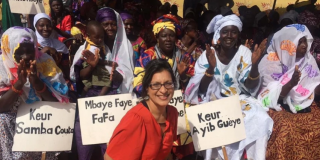
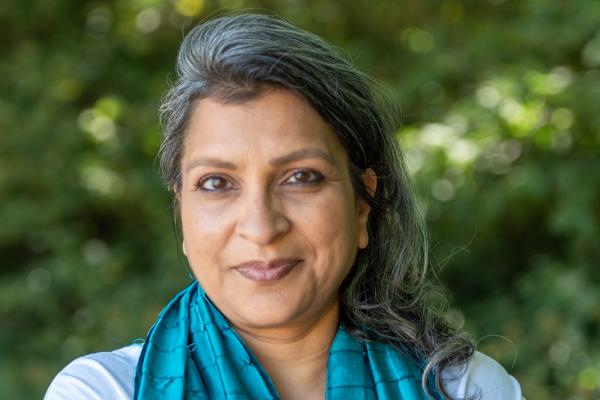
I'm Julia Lalla-Maharajh, Chair of the International Board at VSO. Growing up in the UK, I was already familiar with the VSO brand, but I got to know it better by accident. Walking down the street, about 15 years ago, I noticed a sign advertising an open day for VSO. I remember thinking I had nothing to offer – I'm not a medical or educational professional, my life has been about the corporate world, about influencing, about politics, about communication.
I didn't expect anything to come of me going into this open day, but I discovered so much about the world of international development, particularly the concept of advocacy, and what I might be able to offer with my skillsets.
Soon after, I was offered the opportunity to join the VSO Valuing Teachers programme in Cambodia as an advocacy adviser. That was my first step into the world of volunteering.
“It introduced me to how to listen to people.”
I feel very fortunate that VSO was my gateway into volunteering. During my time in Cambodia and Ethiopia, I noticed that many organisations seemed disconnected from the local partners, and people they were working with. I'd be there waiting for the local bus with a handful of change, and I would watch UN vehicles, and other INGOs, speed passed in their 4x4s.
It felt so incongruous. I think that influenced how I then moved into the space, how I approached my work and the ethos behind it. Because what it really introduced me to, was how to listen to people. How to show up when you are an outsider, not take up others’ space, ensure that you were there to be alongside, and work to further human dignity.
When I encountered female genital cutting in Ethiopia, it was a difficult subject to approach as someone from a society that does not practice it. At the time, my first instinct was to walk away because I felt I had no legitimacy. But there were so few voices in the space and a dire need for community voices to come through for their daughters’ futures, and I had access to Ethiopian colleagues and civil society. This led me to – still somewhat hesitantly – establish the Orchid Project, with a vision of a world free from female genital cutting.
“I felt compelled to get involved with VSO again.”
I became a trustee of VSO two and a half years ago, after volunteering in 2007 and 2008. What brought me back and interested me was understanding so much more about VSO's approach to Volunteering for Development (VfD).
In the past, I was one of those international volunteers who turned up in a country, didn't speak Amharic in Ethiopia, didn't speak Khmer in Cambodia, and though I brought a skill set to contribute during my time as an international volunteer, I always felt a disconnect in terms of how I could best support the work.
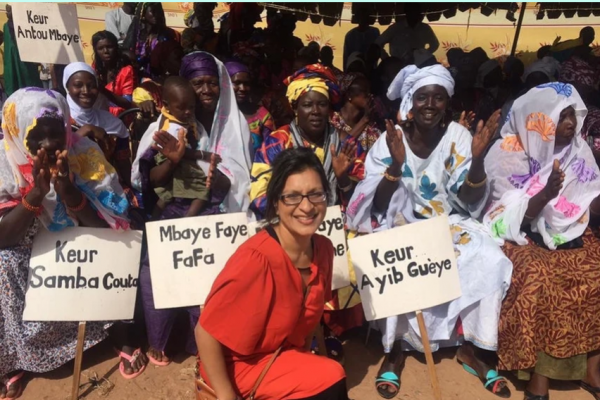
However, after learning more about VSO’s Volunteer for Development methodology, I felt compelled to get involved with the organisation again. VSO's shift towards prioritising the People First principles and core approaches reflects a much-needed understanding of decolonisation, how we think about international development, and how we understand our role in the world.
These principles and approaches, which focus on agency and dignity for primary actors, have been transformative as a springboard into our work in education, health, and livelihoods. They have also played a huge role in my work with Orchid Project. It’s made me ask the right questions – what does it mean to have agency? What does it mean to have dignity? To understand that we don't afford dignity to others; it's how people themselves are.
I feel that's such a bedrock of what we now do and how we want to move forward, especially given the constant challenges and disruptions the world is facing.
VSO is beautifully placed in terms of human and social capital. Essentially, we contribute to building human resilience that is already present in many countries. Our role in this is to support and amplify existing human and social capital through accessing funding that may be inaccessible to others and pointing it in the right direction. This enables communities to access what is available to them and build their own resilience. I envision this work as a process of weaving, where VSO serves as a part of the fabric that reinforces and supports communities as they lift themselves out of poverty.
I have been working extensively in the area of gender equality, and I often feel like the ground shifts beneath our feet. From decisions affecting women's bodies, such as safe abortion and sexual and reproductive health and rights, to practices like infanticide and discrimination against girls: these issues are having such an impact globally, and yet so often the voices of girls and women themselves are silenced or not allowed in spaces that most impact them.
I come back time and time again to communities and social norms, as they represent a critical link to primary actors. For me, I'm so used to a community-level approach, and I want us always to be embracing that connection.
“It takes a complexity of interwoven ideologies to create our societies.”
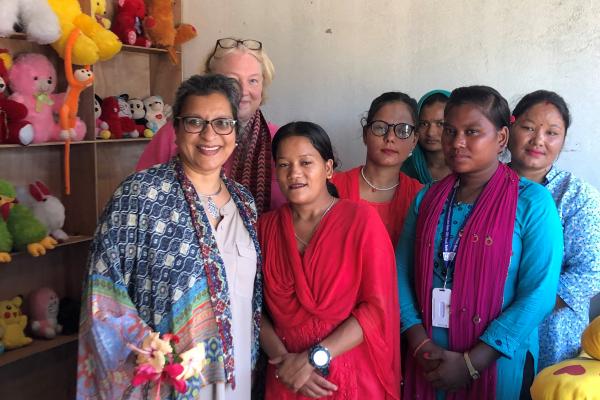
The narratives and actions around gender have undergone significant shifts. As an unashamedly progressive person, with a progressive ideology, I would love to see that mirrored in the world, but I know that’s not how society shows up. It takes a complexity of interwoven ideologies to create our societies.
I do think the shift to the right has limited freedoms, particularly around women's bodies, which have become a battleground for this conflict. You see it encroaching on legal norms, governmental spaces, frameworks, and so on. I know from trying to negotiate at UN levels, it's quite extraordinary how sometimes these systems can be controlled. Another huge concern is in online spaces, where we have seen a rise in sexual violence, which spills into real-life spaces.
But I have a favourite phrase – a rising tide lifts all boats. Despite the challenges, we've seen significant gains at the community level in, for example, ending female genital cutting, by working with social norms to help girls and women reach their potential, agency, and power. By providing access to formal and informal education, we can help lift people up and shift norms to show the power of girls and women in society. Ultimately, everyone in a community benefits. The rising tide lifts us all.
“I'm fortunate to be part of a community that understands the importance of working together towards a common goal”
External shocks often lead to difficult decisions, whether it's funding or responding to external demands quickly. As a board , we've had to make some tough decisions, but you always work just as hard to mitigate the impact of these choices. Being part of the board means that we have a collaborative effort, and our decision-making is guided by that.
Despite these challenges, I'm fortunate to be part of a community that esteems emotional intelligence and human value and understands the importance of working together towards a common goal. The past two and a half years have been challenging, especially during times of turbulence where we had to respond quickly to the external environment.
Looking back at what makes all those hours and, the weeks and months of time investment worthwhile, two key moments stand out.
The first one is an incredible online session we had with a group in Cox's Bazar, Bangladesh, who shared their lives with us. As a trustee, which is a voluntary role, it can be challenging: you don’t know what you don't know. This experience brought to life how the programme was making a difference for primary actors and how it had been curated, without a sense of hierarchy. It was an opportunity for all of us to exercise humanity and connect with fellow citizens, regardless of our backgrounds. It was an extraordinary moment that achieved so much, from a simple online hour; it also helped me to once again reflect on my comparative privilege.
Secondly, I was honoured to travel to Nepal last September and speak with community and national volunteers. It was a moment of realisation for me to understand the role they are playing and the difference they are making for the future of their country, and their motivations for volunteering are no different from mine. I’ve been inspired by COVID to get more involved in my local community, having always volunteered internationally. Through these experiences, I've come to appreciate the importance of showing up and being part of the social fabric that binds us all together.
“We need to be accountable and show that we're making progress, but also stay true to our values”
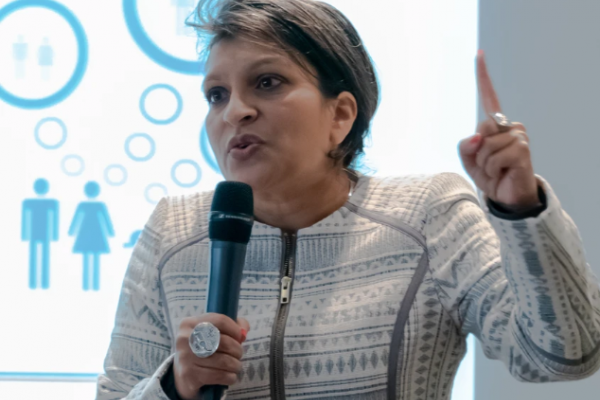
I'm always so interested in impact and measurement because I always think, who is it for? It's not just about proving our worth to donors or stakeholders, but also about understanding the progress we're making and the direction we're heading in.
My background in this is dealing with one of those extraordinarily taboo, difficult, harmful practices of female genital cutting. To measure impact, the knee-jerk response is to count either how many girls are cut, or how many girls are uncut. But there is an ethical dilemma there, and how do we use those metrics against, for example, how effective social and behavioural change is?
The donor cycles are so often just 1-3 years, and the discussion is often about how we prove ROI, how we show that we are having an impact in the shortest time possible. We feed into the machine of course, but in the work, I've done, that social change narrative and intervention has to be so much longer and is very nuanced.
We need to use metrics that reflect the complexity of social change and consider the long-term nature of the work we do. That's why I find qualitative narratives, micronarratives, and personal stories so inspiring – they give us a fuller picture of the impact we're making. I think it's important to strike a balance between quantitative and qualitative indicators. We need to be accountable and show that we're making progress, but we also need to stay true to our values and the people we're working alongside.
“I want to be part of a culture that asks: how do we thrive?”
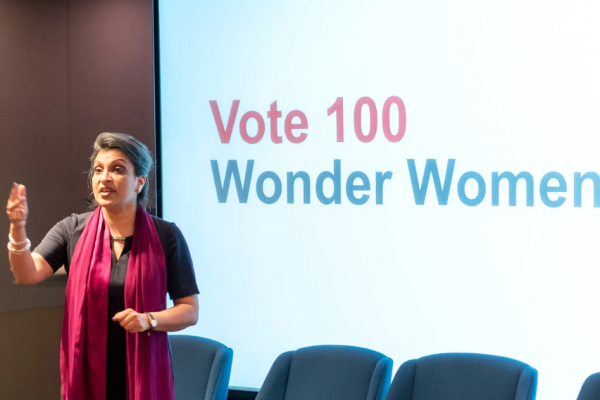
Personally, my goal is to show up fully and give my best to the organisation and the world we work in. I feel honoured and energised to be part of this undertaking, and I feel so nourished and nurtured every time I have a conversation with someone else from VSO, especially staff and volunteers.
Outside of work, I find joy in gardening. I have a tiny space outdoors and on every side of me is the most urban environment – lots of concrete. During lockdown, I dug a garden pond and then last year I couldn’t believe it – I had frogs! I don't know where they came from, but the frogs came and lay their spawn and I had tiny tadpoles and tiny froglets. It's hilarious because I cannot emphasise enough how there's concrete a mile in every direction, but somehow these frogs knew. After everything we’ve all been through with COVID and everything else, there’s something about that connection with nature, that’s just so important to me.
In my application to be the Chair, I expressed excitement to be part of an organisation that embraces feminist leadership principles. I am absolutely the product of my parents, who came to the UK from Trinidad in the 1950s when the environment was very hostile.
My grandmother – also Julia (I am her namesake) – was one of 22 children. Only 11 survived beyond the age of 7 and she was the oldest of ten girls. She had a forced marriage and no access to education. When she was widowed, with six children, she had no land or property rights. Despite this, she persevered and managed to get my mother an education, who became a teacher. I am beyond grateful for both my grandmother’s and my parents’ determination to do what they could in their lifetimes.
I often feel echoes of Grandmother Julia. I feel that I want to be part of a culture that asks, how do we thrive? How do we lean in? How do we do more? How do we support each other? How are we unapologetically feminist in times when these truths are being attacked and eroded?
I think we do that by showing up, making our presence known, ensuring we're giving space to others, understanding what it means to support dignity, listening, listening, listening, and being as kind as we possibly can. Above all, I love the quote by Margaret Mead: “Never doubt that a thoughtful, committed group of citizens can change the world; indeed, it is the only thing that ever has.”
Life at VSO
Read our Life at VSO series for more personal accounts of what it's like to work at VSO.
Read more

The two volunteers empowering girls and young women in Mozambique
Nelma and Carmirene and are two volunteers working on VSO's EAGLE project in Mozambique. For Nelma and Carmirene, education is not just about school, it is about meeting people where they are and using the right tools to challenging harmful norms. Here are their stories.
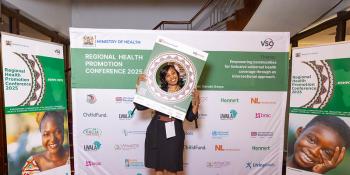
In photos: Our Regional Health Promotion Conference 2025
Check out some of our favourite photos from Regional Health Promotion Conference (RHPC25). This event sought to reimagine Universal Health Coverage through the lens of intersectionality.
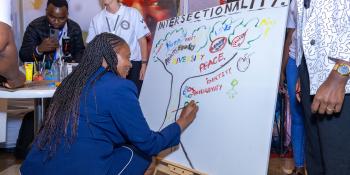
Using intersectionality to create healthy beginnings and hopeful futures
World Health Day brings global attention to the urgent need to end preventable maternal and newborn deaths. Learn more about how our Regional Health Promotion Conference is tackling these issues head on.
